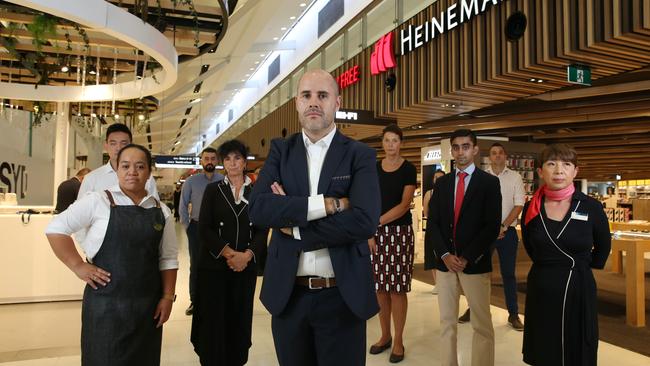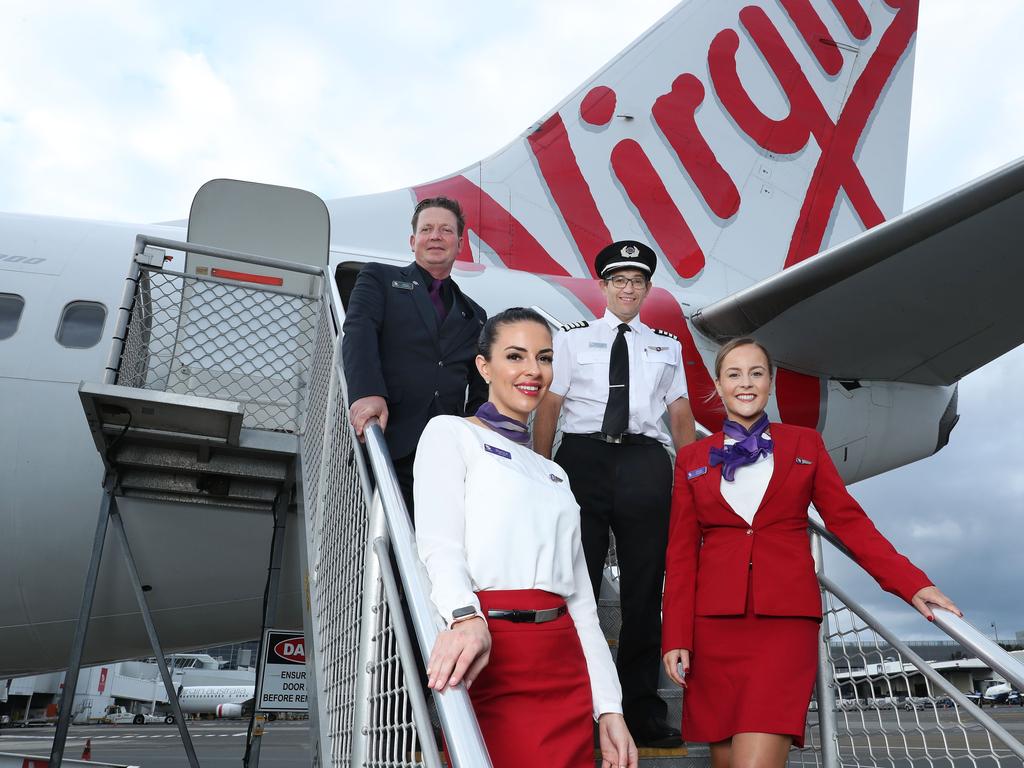More job losses loom as duty free retail trails in two-horse race
Heinemann Australia chief executive Richard Goodman knows he is going to have to make some hard choices in the next weeks.

Heinemann Australia chief executive Richard Goodman knows he is going to have to make some hard choices in the next weeks, laying off even more of his staff when the JobKeeper allowance goes at the end of the month.
While some sectors of the retail and the tourism markets are doing well, the retail market aimed at international travellers, including duty free stores, has been decimated by the closure of international borders a year ago.
“We have been hanging on by the skin of our teeth,” an emotional Goodman, whose company has duty free operations at airports in Sydney and the Gold Coast, and who is also chair of the Australian Duty Free Association, told The Australian in an interview at an almost deserted Sydney international airport on Thursday.
Goodman and the sector — which includes companies such as DFS Australia, Lagardere Travel Retail, Lotte Duty Free and Dufry — were dealt a blow on Thursday with the announcement of the Federal Government’s $1.2 billion travel industry assistance package, learning that their pleas for a continuation of JobKeeper had fallen on deaf ears.
“We are at almost zero revenue and almost zero passengers,” he said.
“Unfortunately the effects of the border closures continue beyond the end of the JobKeeper on March 28.”
While many sectors of the retail industry have bounced back from COVID closures — and some such as supermarkets and homewares have had an additional boost by consumer money saved from lack of international travel — the travel retail sector has been hard hit, with the international sector now on its knees.
“It’s a two-horse race,” Goodman says.
“You have domestic retail which has been doing very well,” he said. “Then you have us who are kneecapped because we have no ability to trade.
“We have been doing everything we can to keep people in jobs and now we have lost all hope as of today.
“We feel incredibly disappointed and let down despite our direct communication with a number of federal ministers who are aware of our issue but we have had no support.”
While the federal government’s travel assistance package has been aimed at boosting domestic travel to specific areas, it continues to keep the international borders closed.
Once Australia’s busiest airport handling between 24,000 and 36,000 people a day, Sydney airport now sees only a trickle of about 800 departures a day by people who have gained government travel exemptions with very few of them stopping to shop as they hurry past wearing masks.
Goodman, whose company had been enjoying record business just before the onset of COVID early last year, has already laid off 170 of his company’s staff of 450 in Australia over the past year, hanging on to the rest — until now — with the help of JobKeeper.
They are part of the more than 1000 jobs in the duty free and associated international airport retail sector he estimates have already been lost over the past year.
March 28, he says, will see many more jobs lost.
“We have been hanging on by the skin of our teeth,” he said.
He now has to make heartbreaking decisions to lay off more staff once JobKeeper runs out on March 28 — loyal, trained staff he knows full well he will need once international borders reopen.
“I am not trying to dramatise it,” he says, after taking a photo with a group of airport workers, one of whom was in tears.
“From a reality point of view I have a responsibility to employ staff and I have a social conscience to ensure I can support them in the best times and in the worst. Right now I am potentially putting them into a job market which isn’t very positive.
“We have cut through the fat and we are into the meat right now.
“There are a lot of really good people who have worked at the airport for 10 and 20 years and now they are worried about their jobs.”
One of those is Toni Martello, who has worked at Sydney airport for the past 40 years overseeing a team at the Heinemann store at the airport, her Italian-speaking background a help with international travellers.
Martello, who is facing unemployment at the end of the month, was in tears when The Australian spoke to her.
“I have nowhere else to go if I don’t work here,” she said. “I have always been in duty free. It has been my whole life.”
“I am very emotional. My staff is like my family.”
“I don’t know what I am going to do.”
She says JobKeeper has allowed the duty free stores to hold on to highly trained staff in the hope of borders reopening.
“This is a very specific market. Our staff are often the first people international travellers see when they arrive in Australia and the last people they see as they leave.”
Australian Retailers Association chief executive Paul Zahra said COVID had crippled the travel retail industry.
“Some businesses have lost more than 90 per cent of their revenue since the pandemic started,” he said.
“International borders have remained closed to visitors for longer than envisaged.”
“Travel retailers, including duty free shops, are at breaking point.
“These are businesses within airports and CBD tourist shops which remain largely deserted.”
Australia saw only 7570 international arrivals in November, according to the latest figures from Tourism Australia — down by 99 per cent compared with the same period in 2019, Zahra says.








To join the conversation, please log in. Don't have an account? Register
Join the conversation, you are commenting as Logout